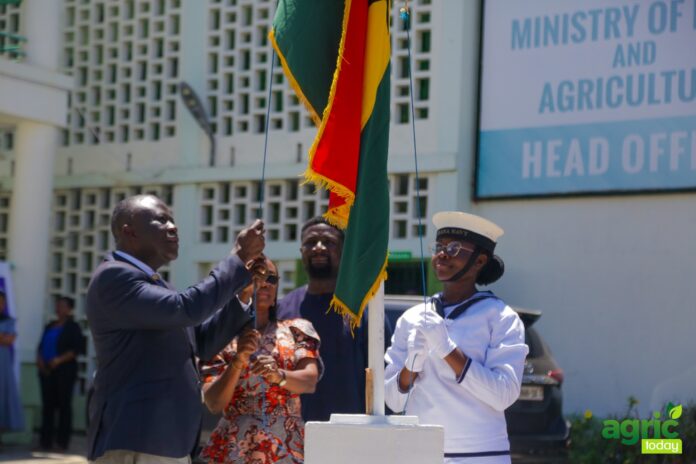Right to Food for Better Life and Better Future is critical to attaining SDGs of the United Nations. However, due to the climate crisis efforts to combat hunger are currently off track, leading to significant food inflation worldwide.
To address this challenge across the globe during World Food Day, the Deputy Minister of Food and Agriculture, (Crop), Yaw Frimpong Addo delivering the speech on behalf of the Minister of Agriculture expressed the ministry’s unwavering commitment to fighting hunger and malnutrition.
He emphasized the need for improved food and nutrition for all citizens. His remarks highlighted the alarming statistic that nearly 29% of the global population experiences food insecurity.
According to the World Bank, efforts to combat hunger are currently off track, leading to significant food inflation worldwide.
He pointed to regional disparities in food security in Ghana, linking the challenges to climate change and the heavy reliance of farmers on rainfall. He noted that only 1% of the farming population has access to irrigation systems, while the majority depend solely on rainwater for agricultural activities.
This dependency makes food production vulnerable to climate variability, exacerbating food insecurity.
The Deputy Minister detailed various government interventions aimed at mitigating food insecurity in Ghana. He highlighted the “Planting for Food and Jobs” Phase Two initiative, designed to boost local food production and alleviate hunger.
Additionally, he mentioned the “Ghana Cares Obaatanpa” program, among other initiatives, that will contribute to addressing food security challenges in the country.
Emphasizing the government’s dedication, the deputy minister affirmed the commitment to realizing the theme of this year’s celebration: “Right to Food for Better Life and Better Future.”
The Ministry of Fisheries and Aquaculture Development also reiterated its commitment to the theme of this year’s World Food Day celebration.
They highlighted that the focus on the “Right to Food for a Better Life” aligns with their developmental agenda aimed at eradicating poverty, hunger, and malnutrition. The ministry acknowledged the significant role that fish plays in the diet of many Ghanaians, particularly given health concerns related to meat consumption.
Furthermore, the ministry introduced the National Aquaculture Plan, which is a blueprint for enhancing food availability, especially in fish production. This initiative aims to improve food security and provide Ghanaians with access to nutritious sources of protein.
Ms. Aurore Rusiga, the Country Director of the World Food Programme, also underscored the importance of ensuring that no one is left behind in the fight against hunger.
She emphasized the necessity of providing safe and nutritious food for all. Rusiga urged Ghanaians to engage in food production that meets international standards, particularly those recognized by the United Nations market.
“The right to food is not merely about having something to eat; it encompasses ensuring that everyone has access to nutritious food,” she asserted.
Rusiga emphasized that the WFP in Ghana is dedicated to improving access to food and supporting smallholder farmers in their efforts to produce food sustainably.
The FAO also highlighted its crucial role in promoting food security. FAO Country Representative Ms. Priya Gujadhur shared a statistic, indicating that over 730 million people around the world lack access to adequate food.
She explained that the FAO is actively working to enhance the livelihoods of more than 12,000 smallholder farmers across six districts in Ghana. The organization firmly believes that food is not just a necessity; it is a fundamental human right.
World Food Day, observed every October 16, serves as a vital reminder of the global fight against hunger and malnutrition. Established by the FAO, this day focuses on promoting sustainable agriculture and equitable access to food for all. The theme for 2024, “Right to Food for a Better Life,” advocates for recognizing food as a fundamental human right.
This significant event brought together various dignitaries and stakeholders committed to addressing food security issues. Among the notable attendees were the Deputy Minister of Food and Agriculture (Crops), Yaw Frimpong Addo; representatives from the Ministry of Fisheries and Aquaculture Development; delegates from the World Food Programme (WFP); and officials from the Food and Agriculture Organization (FAO), among others.
World Food Day: Right to Food for Better Life and Better Future declines due to climate crisis.
Ad article








